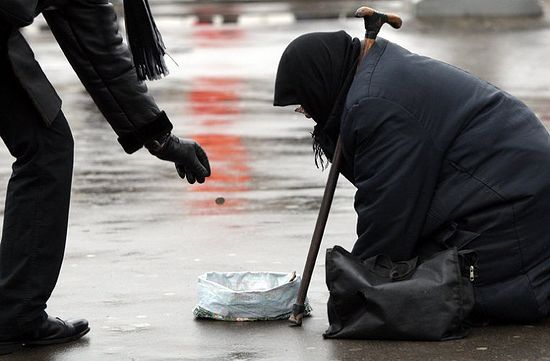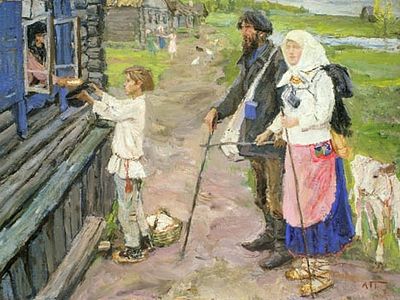
People are generally divided into two groups. The first are those who give according to their means to all, without thinking about it or asking any questions, following the Lord’s words, Give to him that asketh thee, and from him that would borrow of thee turn not thou away (Mt. 5:42). The second group is of those who do not give money to “bums,” considering that we mustn’t indulge the “bum mafia,” for we participate in their sin of drunkenness and sponging, lying, etc. by giving money to them. These people are ready to fulfill Christ’s commandment and are willing to help people, but only those who really need help. They cite the words of the holy fathers in support of this—that the greatest virtue is discernment, for fasting, prayer, alms, or any other virtue will bring a person no benefit if done beyond our strength or out of season.[1] Truly, no one would give anyone money for a rope to hang himself, no matter how tearfully or insistently he begs it. That rope could be a bottle of liquor, which strangles the neck of the beggar each day with increasing strength, or the rope of lies that you would indulge by giving money. There are hundreds and thousands of such ropes.
So what must we do to fulfill the commandment of Christ and please the Lord in the best way? The answer is simple: love. Try also not to do anything without love. Then everything will settle into place, and even the question itself will seem silly. As we know, Though I bestow all my goods to feed the poor, and though I give my body to be burned, and have not charity, it profiteth me nothing (1 Cor. 13:3). Of course, it is hard to just up and love every homeless person, but it is usually quite possible to show compassion for every person that the Lord has brought to us. I would like to share a little practical experience in helping the homeless under various circumstances.
For example, you are walking to work, and a tipsy beggar asks you for money. What should you do? Don’t be lazy—ask him why he needs money. They are often asking for food. This is the simplest case. Then you need to go with him to the nearest grocery store and buy him something he hasn’t had for many long years. Give him a holiday, as if this were your old classmate. Something tasty and filling, like good sausage, chicken, cheese, yogurt—in other words, something that they could never get for themselves because it is too expensive to eat in sufficient quantities. Even if the homeless person was lying to you at first about food, he will nevertheless be thankful. Try to transfer this thankfulness to the Lord, let him thank the Lord, and not you personally. For example, tell him that it was Christ Who sent you to him today. Then it will be both bodily and spiritual alms. Try to see a deeply suffering person in him; and if you cannot see in even the last “bum” the image of God, perhaps very soiled, clouded over, but nevertheless the great image of God, then perhaps you need to discuss this with your spiritual father and pray about it.
Ask the homeless person what his name is, where he hangs out and how often, when is his birthday, is he baptized. Be sincere and kind with him. Homeless people are very sensitive to insincerity. Do not hasten to judge him. We do not know what we ourselves would be if the Lord had deprived us of His protection and hadn’t guarded us from the demon of drunkenness and other vices. Wouldn’t we be much worse than that person? In a word: love him. Love him to the extent of your heart’s capacity; love him sincerely, for Christ’s sake. And if even a little love is born in your heart for this person, then the next time, when you are leaving your house, you will probably be prepared for another meeting with him: take some food from home, some warm clothing, a book, or something he might like. You will leave fifteen minutes early for work and find him; wait for him, call him by his name, show some concern for him, and increase love in this world, the lack of which is felt ever more sharply. Thus, from day to day you can live for the sake of Christ, taking care of one poor person. Do not just buy yourself off with money, do not limit yourself to one-time help. It is good, but it is not a perfect fruit. You can’t just love for a half an hour and then forget about it.
The only warning is: do not give money for any reason, and do not cave in to their persuasion! Those on the streets in such difficult straights, spiritually sick, are in the absolute majority of cases not capable of using money properly. Buy him the thing he needs, get into his shoes, and understand his problems.
It is important to care for a person’s body, but it is even more important to care for his soul. Do this without being intrusive: let your heart tell you when to talk to him about confession, prayer, or about God’s infinite mercy; about how true life and healing are possible only through the Lord’s healing of his soul, which cannot happen unless he wants it. Sometimes a person hungers for this and wants to hear it right away, but sometimes this happens only years later. St. John of Kronstadt writes about this: “Know that material alms should always be followed by spiritual alms: with affectionate, brotherly, and pure-hearted love for your neighbor. Do not allow him to notice that he is become beholden to you, do not appear proud. See that your material alms do not lose their value through your failure to provide the spiritual.”[2]
Of course, not all possible instances are limited to food, and there are many others.[3] But it is all united by one thing: It is impossible to fulfill Christ’s commandment to Be ye therefore merciful, as your Father also is merciful (Lk. 6:36) without love. With regard to the homeless, this becomes especially obvious. But this relates to other instances: if you help a sick person, you must not just buy medicine; you can’t just send a prisoner a package; you can’t just send toys to a children’s home, etc. This is all very good, but without sincere love this all often loses value, gives cause for sin and vice amongst those who receive it and those who dispense it.[4] Medicines can make other sick people jealous, prisoners can lose your food packages in a card game; and children in children’s homes can become little extortionists. We return again and again to the same question: what should we do? And the answer is always the same: love, love for the sake of Christ. Pray for the sick one, visit him, console him, buy him medicine, talk with other patients, give them little joys and holidays, talk about God’s greatness and mercy; correspond with the prisoner, send him packages, console him and preach, give him hope and make him think about the life he has lived; visit children, bring them toys, draw with them, sing, treat them to cakes, teach them to pray, hope and trust the Lord God, etc. And live this way from day to day for the sake of Christ. Of course, many do not have enough time for all of this. In that case, at least help those who sincerely do these things, and pray for them with your whole heart, which was undoubtedly created for love.
But never take on labors beyond your strength: never take a homeless person to your own house for the night, do not go alone to places where they congregate, do not borrow money from someone else to give to the homeless. You have to be frank about the fact that the majority of people in this social stratum are spiritually very sick, often psychologically as well, and always physically. Such attempts often end tragically. They are often just the consequence of pride and neophyte zeal.
In the mind of some people lives a myth that if you give a person an apartment and work, he will get better. Practical experience shows that this is not the case. Without peace with God, without a divine miracle of healing of the soul, this is not possible. But we can be God’s co-laborers, increasing love and helping a person to turn and face God.
Furthermore, it has to be said that mercy need to be shown toward all—the rich and the poor, the good and the bad; only we must not indulge mortal sins of lying, drunkenness, promiscuity, and others, and we must approach everyone with love and discernment. “He who gives alms, in imitation of God, does not discriminate in bodily needs between the mean and kind, the righteous and the unrighteous”[5]
Thus, in very complicated situations I have had to say sincerely to a persistently lying homeless person that I absolutely do not believe him, but I will help him for Christ’s sake, for the sake of the love that Christ has given for him. It is important that without love, even such a great virtue as discernment can turn into judgment, justification of one’s own greed, and laziness. We have to pray that God would give us the gift of discernment. This gift is given for a life in Christ that is kind and full of mercy.[6]
When going to do works of mercy, we must not forget to pray to God that He would give us the strength and knowledge to fulfill His commandment as is pleasing to Him. In general, prayer is an inalienable part of works of mercy. Without prayer, it is almost impossible to do anything pleasing to God. We can calculate, make agreements, be sure of success; but if there was no prayer, then our works are like a house built upon sand. A homeless person who has not eaten meat for a long time can feel sick after eating it now; a new jacket can become the cause of his getting beaten; renewed identification documents can be stolen by his “friends” and used for criminal purposes which could have unforeseen consequences; medical help could cause complications; and the list goes on.
If we have talked with someone it would be good to pray briefly about that person, even if we do not know his name, but especially if we do know it. Some pastors bless to read the prayer, “O Heavenly King,” especially if the conversation turns to spiritual matters. When you approach someone, it would be good to smile sincerely. After all, it is wonderful to be a participant, fulfiller, and conduit of God’s mercy.
You must never combine your gifts with reproaches against his way of life, with moralizing and unsolicited advice. You have to help him simply, without trying to teach him. It is hard enough for him, even if it is his own fault; added reproach and moralizing would only be one more aggravating circumstance for him. Our job is not to aggravate, but to try to ease his burden if only for a second. You can only give advice after getting to know and love the person, if he trusts you, and only with prayer and inner humility.
When talking with “bums,” we have to watch that presumption does not show up in our speech. And if while giving alms we allow ourselves to be high-minded toward the person or vainglorious, this will wipe out our virtue, make our behavior vile in the Lord’s eyes; and He will without fail punish us for this if we do not repent of it.
This may all seem hard to fulfill, but it is worth the effort. These labors of mercy are real, active proof of our faith and love for Christ. Most important of all: the Lord helps us when we do acts of mercy. He gives us special grace, often even despite our vanity and laziness. If a person sincerely tries to please and love the Lord, the Lord covers and corrects him; even more than that—He turns our mistakes into something glorious. Grace begins to transform our souls, and the grain of the Kingdom of Heaven begins to grow. A person begins to feel this special joy of a new spiritual reality more and more each day: Again, the kingdom of heaven is like unto treasure hid in a field; the which when a man hath found, he hideth, and for joy thereof goeth and selleth all that he hath, and buyeth that field (Mt. 13:44). Abiding in this grace so transforms the soul that work which seemed impossible becomes simple and even desired.
By helping people, do not hope to change the world and all the homeless, do not expect them to thank you—do it all for the sake of Christ’s love. Do not despair or be afraid if after all your efforts someone turns your alms toward evil. “Give to every one who asks you, and ask it not back; for the Father wills that to all should be given of our own blessings (free gifts). Happy is he who gives according to the commandment, for he is guiltless. Woe to him who receives; for if one receives who has need, he is guiltless; but he who receives not having need shall pay the penalty, why he received and for what.… And also concerning this, it has been said, Let your alms sweat in your hands, until you know to whom you should give.”[7]
It goes without saying that in our time there are saintly people living, but for ordinary sinful city dwellers, worn out by the rat race of consumerism, deprived of prayer of the heart, not capable of perfect fasting, not having time for apostolic service, sunk in credit card bills and everyday affairs, “Alms given for the sake of Christ, for the sake of love for Him, cleanses us of sins more than sacrifices, opens the heavens more than virginity, and can make one equal to the apostles.”[8]
A few words must be said also for those who never give alms at all to “bums,” considering that these people are themselves at fault for all their problems. I will say this: Perhaps you are right, but isn’t the Lord able to help and resurrect even the dead? Does the Creator of the universe, heaven and earth and all that exists need our pennies and millions? Is it really important to Him which pocket carries our ten-dollar bill? Or can’t He feed the hungry, clothe the freezing, give shelter to the homeless? The good Lord can do all these things, but He has entrusted them to us. Then shall the King say unto them on his right hand, Come, ye blessed of my Father, inherit the kingdom prepared for you from the foundation of the world: For I was an hungered, and ye gave me meat: I was thirsty, and ye gave me drink: I was a stranger, and ye took me in: Naked, and ye clothed me: I was sick, and ye visited me: I was in prison, and ye came unto me. Then shall the righteous answer him, saying, Lord, when saw we thee an hungered, and fed thee? or thirsty, and gave thee drink? When saw we thee a stranger, and took thee in? or naked, and clothed thee? Or when saw we thee sick, or in prison, and came unto thee? And the King shall answer and say unto them, Verily I say unto you, Inasmuch as ye have done it unto one of the least of these my brethren, ye have done it unto me (Mt. 25:4–40). And in order to serve Christ we don’t have to have lived two thousand years ago; we can simply give a bowl of soup to a homeless person and say to God: “You are hungry, Lord. Here, eat.”
* * *
This article was written from experience in the Russian
reality, but it is no less true anywhere. It is
regrettable, however, that the abundance of Russian
commentary to the article remains untranslated, for it
shows how much thought was given to the problem. Here is
but one short thread:
From Natasha and son:
For those who are not bums: if you have to spend the night (any time of the year) in the city, but not in a home, without comforts [running water, etc.], without a bed, in your clothes, on a cold stone or cement floor, in a desolate or dirty place, it is utterly impossible to get some sleep without alcohol or sleeping pills. After one such night your whole organism hurts, especially your head, your eyesight deteriorates to half, your thought and speech processes slow down, and you have a horrible feeling of untamable hunger, boredom and hopelessness.
I did not drink or gamble away my home—I was
simply sent out to the streets by the owner as someone who
is not a member of the family. That is, I am a poor person
with a child, and not a professional beggar, and I pray
for my benefactors each time they give me
alms…
I am a bum, I have AIDS and hepatitis C. I don’t
have the appearance or strength it takes to get work or an
apartment—serious pains, distracted attention,
sudden allergy attacks (Bannister's disease),
endogenic toxicity. I don’t drink or smoke, but I
look like a homeless nothing (my kidneys and liver
can’t handle the toxicity). Precious Almsgivers are
goodness! Give, give under the condition that you are
giving to a person unto salvation in Christ, and not for
this senseless fallen life; tell him, “Here, I am
giving you this so that you would go to Church and pray to
Christ in the church for yourself and me!...” Give
with a name: “Pray for me (name)!!!” Then
there is sense to giving every day (also for those for
whom you can’t pray in church or at home).…
Remember, O Lord, my benefactors—Your righteous
ones, for through their alms they have given me faith in
You and hope in Your mercy!!!
From Tatiana:
A very good article, but I was most of all touched by the commentary from Natasha and son. Poor woman. How can I help you?



